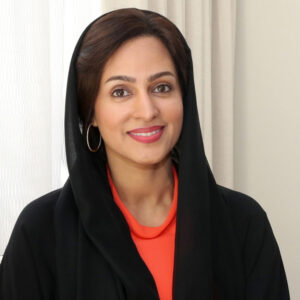Dr. Mariam Matar
Founder and Chairperson of UAE Genetic Diseases Association
Dr. Mariam Matar
“We see a large number of women decision-makers, owners and partners in leading healthcare organizations”

Dr. Mariam Matar, Founder and Chairperson of UAE Genetic Diseases Association, is one of the most prominent Emirati scientists and the most important founders of the Society of Genetic Diseases. She is leading the scientific and healthcare community of the Arab region through a fundamental progressive shift in thinking about genetics and preparing the stakeholders to embrace the science of genetics, technology and tools available for empowering the Arab nations.
We would like to shed light on leading professional terminals?
Multi-award winning International Leader, and Mentor, I’m recently recognised as ‘Pioneering Arab Woman in Healthcare Innovation 2019’ by 21st Pioneer Leadership Award in Healthcare, Kuwait. I’m also leading the scientific and healthcare community of the Arab region through a fundamental progressive shift in thinking about genetics and preparing the stakeholders to embrace the science of genetics, technology and tools available for empowering the Arab nations.
- First Woman Director General in Dubai Government – Community Development Authority.
- First Emirati woman Undersecretary in Dubai Government – Ministry of Health.
- Recognised as ‘Pioneering Arab Woman in Healthcare Innovation 2019’ by 21st Pioneer Leadership Award.
- Among two chosen Arab women members of Selection Committee of Zayed Sustainability Award.
- Represented UAE women as recipient of prestigious Shaikha Fatima Leadership Award USA.
- Represent Arab scientific community as Co-chair and committee member of the Global Commission to End the Diagnostic Odyssey for Children with a Rare Disease.
- Recognised among top 20 Arab scientists with the biggest contribution to humanity by British Scientific Community.
- Mentored over 12,000 young professionals.
- Founded over 14 non-profit organization and charities in the last 17 years.
- The most powerful scientist in the UAE from 2014.
The most recent award for the “Arab Women in Health Innovation Award 2019 ‘’. What is the added value of such unfairness in your career?
H E Sheikh Nahyan bin Mubarak Al Nahyan, Minister of Tolerance and president UAE Genetic Diseases Association congratulated me and said that this is a win for UAE, a country which encourages leaders and celebrates innovators. I receive awards such as this one on behalf of my country and my fellow women scientists.
As a representative of Emirati and the Arab women, especially women scientists, and a mother of a young daughter, my recognition is an opportunity for me to show the level of qualifications, performance, standards and capabilities of women in Arab world.
The best recognition that one can get is the one that comes from one’s own people. Still, being in the service of people and giving generously are for me better than any award.
The UAE was the first in supporting women to reach the highest ranks, where she held many leadership positions. How do you evaluate the reality of Emirati women in the health sector?
On Emirati Women’s Day, UAE celebrates the role and contribution of women as a partner and supporter of the country’s development. The mother of the nation, Her Highness Shaikha Fatima bint Mubarak, Chairwoman of the General Women’s Union, President of the Supreme Council for Motherhood and Childhood, and Supreme Chairwoman of the Family Development Foundation is the visionary and force behind creating strategic and long-term support, empowerment and encouragement to women to take up senior positions in business and government roles.
In healthcare, traditionally we have seen more women in support services however today the women are placed very well as specialists, doctors, and senior management roles. Also, we see a large number of women decision-makers, owners and partners in leading healthcare organizations and providers as well as investors in the healthcare sector. So women are not only working in the operational side but also driving the decisions, the strategies and at the same time living as role models for younger women.
To what extent have women in leadership positions contributed to improving and strengthening the outcomes of the health system?
I’m very honoured by the trust put in me by our government in promoting women. Our founding fathers were visionaries who created strategy to include women in the nation building programs from day one.
Our biggest role model is Sheikha Fatima bint Mubarak, Chairwoman of the General Women’s Union, Supreme Chairwoman of the Family Development Foundation and President of the Supreme Council for Motherhood and Childhood. She is a leading light to women of this country and her beliefs, the wise leadership and trust in our capabilities had made it possible for Emirati women to make a strong mark in all businesses and communities in the world.
Could you tell us about innovative initiatives in empowering the community and individuals more vulnerable to genetic disorders?
Since founding UAE GDA in 2004, we have achieved:
- Legislation on Mandatory Premarital screening.
- Legislation on Mandatory Newborn screening.
- A national screening program for the common genetic blood disorders in 2006 aimed at identifying Thalassemia, Sickle cell anemia and G6PDH carriers in the UAE population. The largest population screening program till date in the UAE.
- Manal – Folic Acid prevention program & WHO fortified wheat campaign.
- A recent cabinet decision that rules that unmarried women and couples can now freeze their eggs in the UAE.
- Legislation on ban of smoking in public places in UAE.
What are the tasks assigned to the Emirates Genetic Diseases Association? What are the achievements of the association?
UAE GDA and Sheikh Zayed Research Centre were founded in 2004 as a dedication to the memory of His Highness Sheikh Zayed bin Sultan Al Nahyan, founding father of the U.A.E. In 2019, the “Year of Tolerance” UAE GDA is committed to bringing diverse experts and tools in genetic research to UAE and the Arab world for a healthier and happier community in the UAE. Since 2004, UAE GDA is the only nonprofit organization in the region working towards the awareness and prevention of most common genetic disorders.
The first and the only non-profit organisation in the region which is focused on genetic disorders awareness, education and research.
- The first and the only non-profit organisation in the region which is focused on genetic disorders awareness, education and research.
- Volunteers lead the work.
- Arab region’s longest running awareness and screening campaign on common genetic disorders.
- Pioneered the concept of “community empowerment” and “prevention centric genetic disorders management”
- Support high-risk community from step one till they receive appropriate medical care.
- Offer free genetic screening and subsequent free counselling.
- Representing UAE in leading global health awareness campaigns and alliances.
- Established as a knowledge centre and hub between global and regional research and academic institutions.
What about the latest developments in genetic science? To what extent will it contribute to the treatment of many genetically transmitted diseases?
Gene mutation had far-reaching impact on human population in the history. Today, Science is capable of reversing DNA mutation in days.
Scientists are putting the human genome to work & using genes to treat disease and three key ways the technology and science in leading the prevention and management of genetic disorders is:
Stem cell therapy, in which human stem cells are used to repair disease-damaged tissue.
- Gene mutation had far-reaching impact on human population in the history. Today, Science is capable of reversing DNA mutation in days.
- Scientists are putting the human genome to work & using genes to treat disease and three key ways the technology and science in leading the prevention and management of genetic disorders is:
- Gene-transfer approach in which a wild-type copy of the mutated gene is delivered.
- RNA modification therapy, in which the mRNA encoded by a mutant gene is targeted.
- Stem cell therapy, in which human stem cells are used to repair disease-damaged tissue.
What is the new scientific research in the field of genetic diseases? And how this reflected on the course of treatments?
Scientists worldwide are discovering new use and potential of gene therapies.
Two key examples are:
STEM Cell which is considered as frontiers of regenerative medicine as they have indefinite self-renewal and potential to differentiate into other types of cells.
Second is the potential of gene editing. The goal of a genome-wide screening experiment is to generate and screen a population of mutant cells to identify genes involved in a particular phenotype. CRISPR can be readily scaled up for genome-wide screening due to the broad range of potential target sequences and ease of generating gRNA-containing plasmids
Where is the importance of early diagnosis of hereditary diseases and pushing patients towards the adoption of the best means of care dedicated under the prevailing beliefs that this will not change anything in the course of the disease?
Genetic disorders can be prevented through education, as education is the supreme key in order to manage genetic disorders.
We strongly believe that prevention is the key to reduce the impact of genetic disorders, socially and economically, and it’s a long-term sustainable solution, especially in a country like ours where close to 60 percent of population is under 30 years of age.
What do you say about the future of genetic diseases?
The new and emerging sciences and research reflect the increasing scientific evidence supporting the health benefits of using genetic tests and family health history to guide clinical and public health interventions. The future of genetic disorders is centered around the prevention and preventive screening.
Tens of thousands of genetic tests are currently in trial and also available, which have the potential to improve health in a variety of ways by informing healthcare through: Risk prediction, prevention, diagnosis, treatment, including choice of medication and dosage and prognosis.














